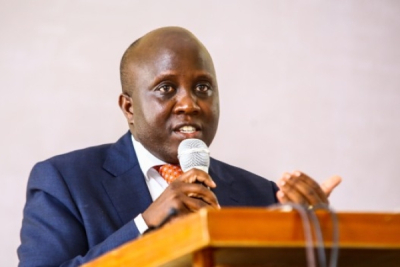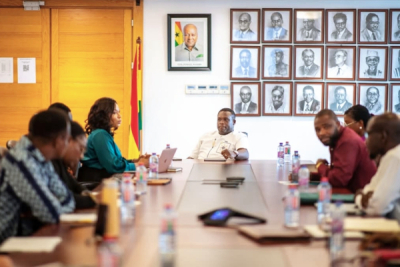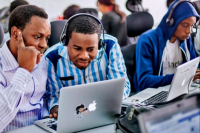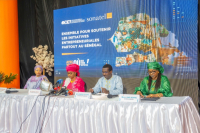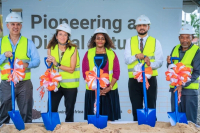
Tech (1148)
Benue State, like the federal government, is emphasizing digital transformation. To this end, the state entered into a partnership with Huawei in November 2024.
Benue State announced this week that it is committing to training 40,000 civil servants in digital tools and ICT skills. The Nigerian Data Protection Commission (NDPC) will be among the entities providing part of this training.
The program aims to equip civil servants with the skills to effectively utilize the platforms implemented by the state government to support its digital transformation efforts. These solutions include an electronic document management system, a geographic information portal, a start-up support platform, and a dedicated website for the Office of the Head of Service of the State.
"Through this training, we are fostering a future-ready workforce capable of adapting to the demands of a rapidly evolving world," said Hyacinth Iormem Alia, Governor of Benue State. This perspective is also supported by the Organisation for Economic Co-operation and Development (OECD), which shares this vision in its recommendations.
In its report titled "Developing skills for digital government: A review of good practices across OECD governments," the organization states that “to support the shift to digital government, countries must invest in developing the skills of civil servants.”
The OECD further notes that digital technologies have had—and will continue to have—a profound impact on economies, labor markets, and societies. This trend is echoed by the World Bank, which forecasts that nearly 230 million jobs in Sub-Saharan Africa will require digital skills by 2030.
By Isaac K. Kassouwi,
Editing by Sèna D. B. de Sodji
The ride-hailing market in Tunisia has seen significant growth. However, the recent suspension of several platforms, most notably Bolt, has brought to light the difficulties faced by drivers and the local economy. This situation has created uncertainty about the future of the sector.
Tunisia's Interior Ministry announced on Monday, March 24, the suspension of ride-hailing taxi apps in the country, citing an investigation into money laundering and tax fraud. According to Tunisian authorities, the companies involved were operating without legal licenses and transferring funds abroad through bank accounts that did not comply with local regulations. While the official statement did not explicitly name any specific company, a source familiar with the matter confirmed to AFP that Estonian-based Bolt was the primary target of the decision.
Bolt Drivers Face Uncertainty
Bolt, which began operations in Tunisia in 2019, quickly gained a significant share of the market, particularly in major cities such as Tunis and Sfax. The app enabled thousands of drivers to become self-employed and establish this activity as their primary source of income. Industry estimates suggest that over 5,000 drivers were registered on the platform in Tunisia. The suspension of the app has plunged these workers into a state of uncertainty, raising the risk of further increasing the country's unemployment rate. According to the National Institute of Statistics, Tunisia's unemployment rate stood at 16% in the third quarter of 2024.
Furthermore, most Bolt drivers do not possess traditional taxi licenses and cannot easily transition into the formal transport sector. The economic impact is also being felt by those who invested in vehicles for this activity, often with outstanding loans. In addition, the app's suspension has created a gap in the urban transport sector, where alternatives such as traditional taxis are often criticized for their unreliability and lack of regulation.
Impact on Users and the Local Ecosystem
The arrival of ride-hailing services helped address the shortcomings of often-inadequate public transport in Tunisia. Many Tunisians embraced on-demand taxis for their daily commutes, drawn by their reliability and competitive pricing. This sector responded to a growing need for quality transport, especially in urban areas where public infrastructure remains limited.
The halt in ride-hailing operations has consequences that extend beyond users. This decision affects the entire economic ecosystem tied to the sector. Gas stations may experience a drop in fuel consumption, while car dealerships and rental agencies risk losing valuable clientele. Additionally, small entrepreneurs specializing in ancillary services such as car washing and maintenance will see their businesses significantly shrink.
Legal Vacuum and Government Ambitions
The suspension of Bolt and other operators highlights the lack of clear regulation surrounding ride-hailing apps in Tunisia. Unlike other countries where legal frameworks have been established to oversee such platforms, Tunisia has struggled to define clear rules. Some observers believe the government could use this situation to launch a domestic alternative. In January, the government announced plans to create a national ride-hailing app, a project expected to be operational by the end of the first half of 2025, according to authorities.
Bolt's Response
In a statement, Bolt emphasized its positive economic impact on Tunisia, including over €10 million invested over three years, a significant contribution to improving urban mobility, and a crucial role in local employment. The company also cited a survey indicating that 85% of Tunisians consider on-demand transport an essential complement to public transportation, with more than half of the population using it on a weekly basis.
By Samira Njoya,
Editing by Sèna D. B. de Sodji
Kenyan authorities are showing a strong interest in artificial intelligence. In February, the country partnered with nine others, including Germany, France, and Switzerland, on an initiative focused on AI in the public interest.
The Kenyan government is set to launch its National Artificial Intelligence (AI) Strategy for the 2025–2030 period this Thursday, March 27. This comprehensive strategy will serve as the guiding framework for the government's AI-related actions over the next five years, with the ambitious goal of positioning the East African nation as a leader in artificial intelligence innovation, both on the continent and worldwide.
"The Kenya AI Strategy is designed to position Kenya not just as a participant, but as a pacesetter in the global AI landscape, with a particular focus on Africa. We are building on our reputation as the 'Silicon Savannah' by creating a robust framework that prioritizes innovation, ethical governance, and collaboration," stated John Tanui (photo), Principal Secretary of the State Department for ICT and the Digital Economy within the Ministry of Information, Communications and the Digital Economy.
The development process for the national AI strategy commenced in May 2024. This involved the formation of a national task force and a steering committee. Subsequently, extensive consultations were conducted, engaging a diverse range of stakeholders including government agencies, private sector representatives, academic institutions, civil society organizations, local communities, and international partners. Among the international collaborators are Germany, the European Union, Canada, the Commonwealth, and the United Kingdom.
According to the United Nations Department of Economic and Social Affairs (UNDESA), the initiatives outlined in the upcoming strategy have the potential to significantly accelerate Kenya's digital transformation ambitions. In its "E-Government Survey 2024" , UNDESA noted, "It is widely accepted that AI technologies can improve public sector operations by replacing administrative tasks with automated processes, increasing efficiency, and eliminating backlogs and redundancies." The report further highlighted AI's potential to support the achievement of sustainable development goals.
By Isaac K. Kassouwi,
Editing by Sèna D. B. de Sodji
Quickpay SA, which previously provided financial services through mobile platforms in partnership with banks, will now directly serve its customers, similar to its competitors. The fintech aims to expand its operations into new markets within the West African Economic and Monetary Union (WAEMU) beyond Senegal.
Fintech firm Quickpay announced on Monday, March 24, that it has secured an electronic money institution (EME) license from the Central Bank of West African States (BCEAO). A subsidiary of EDK Group, Quickpay will now be able to provide mobile financial services within the West African Economic and Monetary Union (WAEMU) directly, without relying on banking partners as it did previously.
"This license strengthens our position as a key player in financial inclusion and allows us to better meet the needs of our users by offering them tailored financial services. It thus contributes to the financial inclusion of unbanked populations, significantly supporting the economic development of the African continent, and more specifically of Senegal," the company said in a press release.
With this new authorization, Quickpay joins a limited group of entities licensed to independently issue and manage electronic money, alongside prominent players like Wave and Orange Finance Mobile, which currently dominate the Senegalese market. Quickpay's entry as a licensed EME into this expanding market could intensify competition and spur innovation. While Wave has gained traction through competitive pricing and user-friendly features, and Orange Money with its extensive network, Quickpay will need to differentiate itself by offering innovative, cost-effective services customized to local requirements.
According to a BCEAO report, the number of electronic money accounts within WAEMU increased significantly, from 94 million in 2020 to 131 million in 2021, representing a substantial 39% rise. During the same period, Senegal experienced a 63% surge in subscriptions, underscoring the growing demand for digital financial services.
Despite Senegal's rapid adoption of fintech solutions, a significant portion of the population remains unbanked, and disparities persist, particularly along gender lines. According to the GSMA report "State of the Industry Report on Mobile Money 2024," nearly 30% of women in Senegal still do not have a mobile money account, while adoption among men is nearly universal. This digital divide presents a major challenge that industry participants, including Quickpay, will need to address to ensure truly equitable financial inclusion.
By Samira Njoya,
Editing by Sèna D. B. de Sodji
- Key documents have been bsubmitted to the government
- The Documents include roadmap and work plan for drafting the legal framework, ministry confirms
- The Bill aims to support startups through tax exemptions, funding, and a new Ghana Innovation and Startup Agency
Ghana has moved closer to finalizing its Startup and Innovation Bill, with key stakeholders submitting crucial documents to Minister of Communication, Digital Technologies and Innovation, Samuel Nartey George, last week.
The submitted documents, including a work plan and roadmap, outline the strategic steps for drafting the legal instrument, the ministry said in a statement posted on Facebook. "The submission of these documents marks a significant milestone in advancing the policy framework that will enhance opportunities for startups, strengthen innovation ecosystems, and promote digital entrepreneurship in Ghana,” the statement read.
The bill, initially drafted in 2020 by the Ministry of Business Development in collaboration with the private sector, has undergone multiple revisions following stakeholder consultations. The Ministry of Communication, Digital Technologies and Innovation aims to initiate the review process by May 2025, with plans to present the bill to the National Assembly before the next parliamentary recess.
The proposed law seeks to promote creativity, innovation, and the use of new technologies to generate substantial added value and enhance competitiveness at international, regional, and national levels. Key provisions include the creation of the Ghana Innovation and Startup Agency, the establishment of a startup support fund, and tax exemptions.
Ghana's startup ecosystem is experiencing rapid growth, fueled by foreign direct investment, mentorship, training, and other support mechanisms, according to StartupBlink. The organization's "Global Startup Ecosystem Index 2024" ranks Ghana fourth in West Africa and 88th globally. Accra, the nation's capital, is ranked 268th out of 1,000 cities, and is home to prominent startups such as Mpharma, CarePoint, Zeepay, Complete Farmer, and Farmerline.
StartupBlink highlighted the potential for increased growth through a rise in female founders. However, the organization also pointed to challenges, including a lack of capacity-building resources and unattractive incorporation clauses. "Ultimately, Ghana's startup scene is still young and holds strong potential for growth," StartupBlink concluded.
By Isaac K. Kassouwi,
Editing by Sèna D. B. de Sodji
- Morocco will install 4,000 smart surveillance cameras in Rabat by end of 2025
- The $10.4 million project is led by Rabat Région Aménagements, Finatech and Alomra Group handling infrastructure and deployment
- Equiped with with facial recognition and license plate reading, the cameras aim at enhancing urban security and traffic management
Morocco is set to install 4,000 smart surveillance cameras in its capital, Rabat, by year-end, joining a global trend of increased investment in video surveillance technology driven by advances in facial recognition and automated data analysis.
The project, spearheaded by public entity Rabat Région Aménagements, carries a budget of approximately 100 million dirhams ($10.4 million). Finatech Group will handle the installation of command and data collection centers, while Alomra Group International will deploy the cameras, which will feature facial recognition and automated license plate reading capabilities.
This initiative aligns with Morocco's digital transformation strategy and its preparations for major international events, including the 2025 Africa Cup of Nations and the 2030 World Cup, which it will co-host with Spain and Portugal. The deployment aims to enhance security and improve population flow management.
According to a report by Mordor Intelligence, the global video surveillance systems market is projected to grow from $81.68 billion in 2024 to $145.38 billion by 2029, representing a compound annual growth rate of 12.22%. Several African nations, including Senegal, Côte d’Ivoire, and the Seychelles, have also recently invested in these technologies to bolster urban security and optimize public space management.
While proponents emphasize the benefits of smart surveillance in crime prevention and traffic management, concerns remain regarding personal data protection and individual freedoms. Morocco’s National Commission for the Control of Personal Data Protection (CNDP) has initiated hearings to regulate the use of these technologies and ensure compliance with Law 09-08, the country’s personal data protection law.
The challenge, as Morocco advances in smart city management, is to balance security innovation with the safeguarding of citizens’ rights.
By Samira Njoya,
Editing by Sèna D. B. de Sodji
- The initiative stems from Mali Digital Awards, supporting local startups
- It offers tailored support, funding, and market access, aiming to foster "Made in Mali" digital leaders
The Malian government inaugurated the Mali Digital Accelerator on Thursday, March 20, a program designed to support the development of the national tech ecosystem. The program will provide startups with tailored support, strategic funding, and market access.
The initiative aligns with the government’s ambition to build a strong and resilient digital economy, leveraging technology for economic growth, modernization, and prosperity. The government aims to foster the emergence of "Made in Mali" digital leaders.
According to the Ministry of Communication, Digital Economy, and Administrative Modernization, the program will address challenges faced by sector players, including funding shortages, lack of mentorship, and infrastructure access difficulties.
The International Finance Corporation (IFC) supports this view, emphasizing that accelerators can unlock startup potential in emerging markets. "Accelerators scout for high-growth potential entrepreneurs and provide training, mentorship, and networking, often alongside seed capital. They help entrepreneurs grow their business faster, or recognize when their ideas are not viable, encouraging them to pivot or exit the market. Successful participation in recognized acceleration programs also signals quality to investors, helping promising firms secure additional funding," the IFC said in a report published in February 2025.
The IFC stressed that effective accelerators in low-income countries must align incentives with local market conditions. The institution recommended integrating into regional investment networks, strengthening connections with the local private sector, and fostering angel investment and venture capital networks in lower-middle-income countries.
"Accelerators can focus on specialization and scale in more developed emerging markets—creating industry-specific programs, building cross-border networks for market expansion, and connecting local startups to global value chains," the IFC added.
By Isaac K. Kassouwi,
Editing by Sèna D. B. de Sodji
Nigeria is home to one of Africa’s most dynamic tech ecosystems. However, a slowdown in funding is beginning to hinder the growth of startups. Through new initiatives, the government aims to stimulate innovation and provide essential support to emerging companies.
Nigeria plans to launch a $40 million fund to support early-stage tech startups, aiming to strengthen the country’s entrepreneurial ecosystem and reduce young companies’ reliance on private investors, officials said.
The fund will be equally financed by the Japan International Cooperation Agency (JICA) and the Nigeria Sovereign Investment Authority (NSIA), which manages the national sovereign wealth fund. Kashifu Inuwa Abdullahi, director of the National Information Technology Development Agency (NITDA), confirmed the final agreement would be signed within the next month.
The initiative is part of Nigeria’s Startup Act, adopted in October 2022, which aims to create a favorable environment for startups through tax incentives and financial support. The act established a 10 billion naira (approximately $8.6 million) annual fund to finance certified startups through seed funding, grants, or loans.
According to Disrupt Africa, Nigeria’s startup ecosystem attracted over $2 billion in investments between January 2015 and August 2022, positioning the country as Africa’s leader. Companies like Flutterwave, Andela, and Opay achieved multi-billion-dollar valuations. However, fundraising dropped to $224 million in 2023, down from $531 million in 2022 and over $1 billion in 2021. This decline highlights the need for government intervention to revitalize the tech ecosystem amid investor caution.
The new fund marks a significant step for Nigeria, which aims to foster local innovation. Currently, 12,948 companies are registered as startups, benefiting from a three-year tax exemption. Low awareness of the law’s benefits has prompted the government to plan a nationwide information campaign.
By facilitating access to funding, the initiative could strengthen support for existing startups and stimulate new tech ventures, reinforcing Nigeria’s position as a leading hub for digital innovation in Africa.
By Samira Njoya,
Editing by Sèna D. B. de Sodji
- DER/FJ and Sonatel partner to enhance digital inclusion and innovation
- Under the partnership, Bambey digital campus will become an innovation hub
- Training programs are to be delivered to youth and women through digital hubs and Orange Digital Centers
Senegal's General Delegation for Rapid Entrepreneurship of Women and Youth (DER/FJ) has entered into a strategic partnership with Sonatel, aimed at accelerating digital entrepreneurship. The partnership, formalized on Monday, March 17, seeks to enhance digital inclusion and foster a competitive digital entrepreneurial ecosystem through targeted initiatives.
The project will harness technological innovation to drive social and economic inclusion, with the partners combining resources to cultivate new leaders in the innovation sector. A key component of the collaboration involves transforming the Bambey digital campus into an innovation hub, designed to equip young Senegalese with advanced digital skills for future employment.
The partnership will also include tailored training programs for youth and women, delivered through digital hubs in regional branches and Orange Digital Centers (ODCs). These centers, which officials have noted are effective as business accelerators, will serve as platforms for a dynamic and innovative entrepreneurial environment.
This collaboration aligns with broader efforts to create an environment conducive to local talent development. It also represents a step toward achieving Senegal 2050 and the country's New Technological Deal, the national digital transformation strategy. The New Technological Deal aims to certify five hundred tech startups and create 150,000 direct jobs by 2034.
Sonatel's initiatives, including the Orange Startup Center and Orange Digital Center, have trained over 39,000 young people since 2019, with a reported 95% job placement rate in Senegal. In 2024, Sonatel invested 800 million CFA francs ($1.3 million) in Senegalese startups and supported 1,600 women through its Maisons Digitales program.
By Samira Njoya,
Editing by Sèna D. B. de Sodji
- This marks the second phase of its data center expansion
- The first phase was completed in 2022 with the construction of a Tier 3 data center
Pan-African data center operator Wingu Group announced the second phase of its Dar es Salaam data center expansion on Tuesday, March 18, aiming to better serve its clients' evolving needs.
Wingu's existing Tanzanian data center, certified Tier 3 by the Uptime Institute, ensures uninterrupted maintenance through redundant equipment and circuits. Its power supply and cooling systems utilize multiple redundant paths, limiting downtime to 1.6 hours annually. The facility is carrier-neutral, accommodating all providers.
"Among the key enhancements is doubling in rack power to support energy-intensive applications with superior efficiency. The facility now offers considerably more white space to accommodate additional racks, pods, and cages, ensuring that it can readily grow to meet the increasing demands of modern digital operations," the company stated in a press release.
This expansion seeks to solidify Wingu's position in a rapidly expanding market, fueled by Tanzania's ongoing digital transformation. According to Statista, Tanzania's data center market is projected to generate $108.97 million in revenue by 2025, with an anticipated average annual growth rate of 7.54%, reaching $145.74 million by 2029.
However, Wingu faces competition in Tanzania's data center market. Raxio Group is currently constructing a carrier-neutral Tier 3 data center in Dar es Salaam. Additionally, IT services provider Oman Data Park has signed a memorandum of understanding to build a data center in Zanzibar.
By Isaac K. Kassouwi,
Editing by Sèna D. B. de Sodji
More...
The Malian government is prioritizing digital technology to boost national economic growth. A core component of this strategy is the digitization of public services.
Malian Prime Minister Abdoulaye Maïga launched two digital platforms designed to enhance public service delivery to citizens on Tuesday, March 18. The platforms, "Trésor Pay" and the Land Information System/One-Stop Land Office (SIF/GUF), mark a step in Mali's digitalization efforts.
"Trésor Pay," a collaboration with all Malian mobile money operators, streamlines and secures payments for services including national identity card and passport fees, traffic violations, and fixed fines. Developed by the Support Unit for the Computerization of Tax and Financial Services (CAISFF) with the National Directorate of Treasury and Public Accounting, the platform is already operational at the Directorate General of Transport and the City Hall of Commune IV.
The SIF/GUF platform modernizes land and property procedures, enabling users to complete all land management operations in a single location. The system is slated for implementation across Bamako's seven districts within the year, aligning with the Government Action Program (PAG) objectives.
These platform launches reflect the Malian government's dedication to digitizing administrative services and improving citizen access to public procedures. This initiative follows the recent launch of a digital platform simplifying access to administrative, identity, and travel documents for the Malian diaspora.
Mali has risen 13 places to 141st out of 193 countries in the 2024 United Nations e-Government Development Index (EGDI). However, challenges persist in enhancing the accessibility and efficiency of digital services. The government’s recent initiatives are expected to further improve Mali's EGDI ranking, optimize public revenue collection, and strengthen governance in the coming years.
Samira Njoya
As digital technology rapidly expands in Africa, data sovereignty is increasingly becoming a business imperative. Across the continent, innovative initiatives are emerging, offering localized solutions to ensure regulatory compliance and safeguard sensitive data.
A new cloud platform, 'Door,' developed by Cloudoor in collaboration with Groupement Orange Services (GOS), is set to launch in West Africa, offering a locally developed alternative to existing foreign cloud infrastructure. The platform aims to address data security and regulatory compliance concerns within the region.
"This initiative marks a decisive step toward strengthened digital sovereignty for African businesses. With this sovereign cloud offering, we are providing local economic players with the necessary tools to innovate, grow, and compete globally while maintaining full control over their data," said Aliou Ba, CEO of Cloudoor.
The innovation arrives as data protection becomes a strategic priority for African businesses and governments. PricewaterhouseCoopers' (PwC) "Africa Cloud Business Survey 2023 – Unlocking the Transformational Power of Cloud in Africa" identifies obstacles to cloud adoption, including budget constraints and a lack of high-quality local providers. Despite these challenges, over 50% of African businesses have adopted cloud computing, according to the study.
Cloudoor and GOS designed Door to address these challenges by making data storage more affordable and accessible. The platform utilizes the Tiers III data center infrastructure of GOS, a key component of Orange's African data center network. This data center, built in Grand-Bassam, Côte d'Ivoire, in 2016, spans 16,600 square meters. Door will officially launch in Abidjan on April 24 and in Dakar on April 29, marking a milestone in strengthening digital sovereignty in Africa.
In addition to secure data hosting, Door offers services aimed at accelerating innovation and modernizing African businesses' information systems. The platform includes a managed DevOps offering to optimize development processes and reduce time-to-market, enabling companies to address technological challenges. Door Deploy, a complementary solution, simplifies the deployment of applications, databases, and artificial intelligence (AI) models on GPU servers.
By Samira Njoya,
Editing by Sèna D. B. de Sodji
Africa's digital sector faces a critical labor shortage, threatening the continent's development. Addressing this gap within the next five years is crucial for reducing youth unemployment and boosting economic growth.
Africa's rapid digital transformation, fueled by its tech-savvy youth and innovative local solutions, is creating a surge in demand for specific tech skills. While projections indicate Africa's internet economy could reach $712 billion by 2050, as Google and the IFC highlight, realizing this potential requires a highly skilled local workforce. However, a significant skills gap persists, posing a challenge as digital expertise becomes increasingly crucial across all sectors by 2030.
Software and Application Development
The rise of startups and digital platforms, coupled with businesses embracing digital technologies, is driving demand for developers in Africa. They are essential for building mobile applications, management software, and tailored solutions for industries like healthcare and finance. Google's 2022 "Africa Developer Ecosystem" report showed a 3.8% increase in professional developers, and the COVID-19 pandemic amplified this trend, creating significant opportunities.
Cybersecurity
Trust is fundamental to a digital economy, and that trust hinges on secure electronic systems for communication, payments, and work. Interpol's "African Cyberthreat Assessment Report 2024 Outlook" reveals a continuing rise in cybercrime across Africa. In 2023, organizations in Africa experienced a 23% year-over-year increase in weekly cyberattacks, the highest rate worldwide. Cybersecurity firm Kaspersky points out that this expanding threat landscape, further complicated by artificial intelligence, is creating growing job opportunities for young Africans in diverse cybersecurity specializations.
Artificial Intelligence
The increasing adoption of AI is transforming key sectors in Africa, including agriculture, healthcare, and finance, generating a growing demand for experts in algorithm and intelligent system design. Numerous African countries have launched AI strategies since 2023, with Rwanda and Kenya leading the way in integrating AI into public services. The rise in training programs across the continent reflects the anticipated socio-economic benefits of AI, a view supported by the African Development Bank (AfDB). Importantly, AI's impact will extend beyond engineering, creating new opportunities in creative fields such as graphic design.
Data Science
Data is the new currency of the digital age. As more young Africans engage with the internet, networks, and digital services, vast amounts of data are generated daily, attracting the attention of businesses and governments. BearingPoint forecasts Africa's big data sector to generate $10 billion in direct revenue by 2030, a significant leap from 2019. To achieve this growth, specialists are needed to analyze and interpret data, providing actionable insights for various sectors, including marketing, commerce, and national security. This demand will also create new professional avenues, notably data protection lawyers.
User experience and user interface (UX/UI)
Digital applications and platforms thrive on positive user experience. UX/UI designers, who develop intuitive and engaging interfaces, are essential for ensuring user satisfaction. Market intelligence firm Mordor Intelligence forecasts the global UX/UI market to grow significantly, from $2.2 billion in 2025 to $9.28 billion by 2030. Although Africa's demand may be less pronounced than in other regions due to its evolving digital landscape, it remains a promising market for UX/UI designers.
E-commerce
Africa's e-commerce sector is experiencing rapid growth, with competition increasing annually. Both local businesses and international giants such as Jumia, Takealot, Temu, and Alibaba are investing heavily to expand their reach. Beyond online retail, related professions in platform management, logistics, and digital marketing are also developing. Organizations like MasterCard, the WTO, and UNCTAD are actively working to build and strengthen this ecosystem. TechCabal Insights predicts Africa's e-commerce market will surge from $55 billion in 2024 to $112.73 billion by 2029, representing a 105% increase over five years.
Blockchain and fintech
Blockchain and financial technologies are revolutionizing banking services and transaction security. Since the COVID-19 pandemic, major African banks have accelerated the digitization of their financial services to improve security, convenience, and competitiveness against the growing number of fintech startups. Over the past decade, fintech has been a leading driver of startup creation and investment in Africa. In 2024 alone, fintech startups secured $1.034 billion, representing 47% of the continent's total tech investment, up from 42% in 2023. As financial inclusion initiatives expand, the demand for skilled professionals in this sector is expected to increase significantly.
Cloud computing
Cloud computing adoption is rapidly accelerating across Africa, according to McKinsey. Companies in banking, telecommunications, and oil are increasingly leveraging the cloud to optimize IT costs and reduce operational expenses. This trend has fueled substantial investments in cloud infrastructure, with global players like Amazon, Google, and Oracle expanding alongside local firms such as Africa Data Centres. PwC reports that 12% of African businesses have fully migrated to the cloud, while 38% have integrated it into most operations. An additional 32% have begun migrating select processes, and 19% are exploring cloud solutions. However, PwC cautions that skills shortages are hindering faster adoption. The cloud computing sector requires a diverse workforce to realize its projected growth, with 6W Research forecasting revenues to rise from $20 billion in 2025 to nearly $45 billion by 2031.
Digital Marketing
With Africa boasting over 400 million active social media users, as reported in the Digital Report 2025, the demand for digital marketing professionals is set to rise significantly. These specialists are crucial for effective online campaigns, making social media a vital commercial space for brands and advertising agencies. Recognizing the sector's growth in employment and revenue, some governments are exploring taxation measures. For instance, in late 2023, Kenyan authorities announced a 15% tax on content creators and influencers.
Digital Energy and Green Solutions
The shift towards renewable energy and digital energy management solutions is a key priority for many development organizations, including the French Development Agency (AFD). The increasing frequency of hackathons focused on these topics underscores the growing need for specialized talent in this area. The International Energy Agency (IEA) also emphasizes the critical role of these technologies in modernizing energy infrastructure worldwide, particularly in Africa.
These emerging digital fields represent significant opportunities for Africa's youth, who constitute 60% of the population. The World Economic Forum's "Future of Jobs 2025" report underscores the growing importance of tech skills, particularly in AI and big data, alongside creative thinking and socio-emotional skills.
To capitalize on these opportunities, investment in education and training is essential. Collaboration between governments, businesses, and educational institutions is crucial to prepare Africa's future workforce.
Muriel EDJO
Artificial intelligence (AI) is reshaping economies and societies, transforming public services, industry, and innovation, among other sectors. By investing in this technology, Morocco aims to strengthen its competitiveness and digital sovereignty.
Moroccan and U.S. officials discussed deepening collaboration in digital technology and artificial intelligence (AI) during meetings in Washington on Monday, March 17, as part of efforts to accelerate Morocco's tech ambitions.
Amal El Fallah Seghrouchni, Morocco's Minister Delegate for Digital Transition and Administrative Reform, met with Steve Lang, the U.S. Ambassador-at-Large for Cyberspace and Digital Policy, and Leila Elmergawi, Director of Global AI Strategy and Policy at the U.S. State Department. The discussions focused on Morocco’s AI roadmap and the Morocco Digital Plan 2030, reinforcing a shared commitment to digital innovation.
"We reaffirmed the strong Morocco-US partnership, advancing cooperation in digital transformation and artificial intelligence to foster innovation and shared prosperity for both our nations," said Youssef Amrani, Morocco’s Ambassador to the United States.
This strategic alliance supports Morocco's "Digital Morocco 2030" initiative, designed to establish the nation as a premier African technology hub. AI is pivotal in this vision, particularly for modernizing public services. Morocco intends to deploy AI-driven solutions to automate administrative processes, analyze data, and enhance service delivery, aiming to leap from 90th to 50th place in the United Nations Online Services Index by 2030.
The United States, according to the Stanford Institute for Human-Centered AI (HAI) AI Index, stands as the global leader in AI, excelling in research, development, and economic impact. Notably, U.S. private sector AI investment ($67.2 billion) dwarfs China's ($7.8 billion), and the U.S. produces significantly more machine learning models (61 vs. 15).
Morocco's strategy leverages this U.S. expertise to expedite its digital transformation and boost its international competitiveness. Enhanced cooperation could unlock access to cutting-edge technologies, bolster digital infrastructure, and attract crucial AI-sector investments. Through strategic knowledge transfer, Morocco also seeks to cultivate its research and innovation capabilities, nurturing a dynamic and competitive domestic AI ecosystem.
By Samira Njoya,
Editing by Sèna D. B. de Sodji




